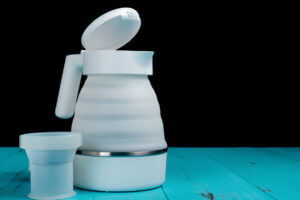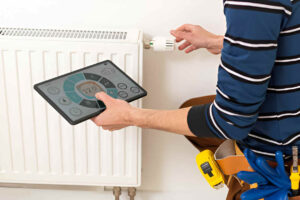How a Portable Water Heater Works and Where to Use It
Introduction
They are great when you need hot water fast and are outside, moving, or in a different place. This little thing will ensure you always have warm water, whether camping, living in an RV, or living off the grid. How does a portable water heater work? What is it mainly used for? How does it compare to other types of geysers, like instant water geysers? This guide will help you choose the best one for your needs.
What Is a Portable Water Heater?
It heats water as it runs through a small, tankless unit called a portable water heater. Instead of storing hot water like traditional geysers, these devices use electric coils or gas burners to heat water as needed.
Check out our guide for a full description of how regular geysers work and how a hot water geyser works.

How Does a Portable Water Heater Work?
Step-by-Step Process
- Water Inlet: When you turn on the faucet or shower, cold water enters the heater.
- Flow Detection: When water flows through the built-in sensor, it turns on the hot element.
- Heating Element:
- A resistance coil quickly heats water in electric types.
- A gas heater, mainly propane, is employed to heat the water in a heat exchanger.
- Temperature Control: A thermostat ensures that the heat is safe for usage.
- Output: It’s quick and easy to get hot water.
If you want to know more about how instant types differ, check out our guide on instant geyser safety and usage.
Different Kinds of Portable Water Heaters
- Electric Portable Heater: Perfect for inside or anywhere there’s power.
- Gas/Propane Portable Heater: Perfect for showering outside, camping, or living in the country.
- Mini Portable Geyser: Small models are great for bathrooms and kitchens. Check out our review of mini geysers for kitchen use based in India.
- Solar/Dual-Fuel Models: Off-grid living now has more eco-friendly choices.
For comparison, you can explore options in our geyser prices list and electric & gas geyser price guide in Pakistan.
Benefits of a Portable Water Heater
On-Demand Hot Water – No hassling and no loss of space.
Portability – It’s not heavy and is easy to carry.
Versatile Applications – From taking showers outside to doing the dishes.
Energy Efficiency – Not as power-hungry as enormous storage geysers.
Safe to Use – With auto-off and flame failure indicators.
If you usually use an electric geyser, you’ll notice that portable heaters use less power when they’re outside.
Where to Use a Portable Water Heater
- Camping & Hiking Trips – Use hot water to cook or take a shower.
- RVs & Travel Vans – Saves space and works well.
- Outdoor Kitchens & Gardens – Hands or dishes being washed.
- Construction Sites – The workers can easily get to hot water.
- Emergency Use – When there isn’t enough water or power.
In RVs and other small areas, horizontal setups are sometimes used. Read our post on horizontal geysers to learn more.
Key Parts of a Portable Heater
A movable geyser has the same essential parts as any other geyser:
- Water inlet & outlet
- Flow sensor
- Burner or heating coil
- Thermostat & safety valve
- Power source (battery, propane, or plug-in)
In our piece on water geyser parts, we went into a lot of detail about geyser parts.

Choosing the Right Portable Water Heater
When you buy, think about:
- Type of fuel (gas or electric)
- Rate of flow (litres per minute)
- Portability (size and weight)
- Features for safety
- Warranty and durability
Families who want to see long-term cost savings can look at our geyser prices and deals.
Maintenance & Safety Tips
- Always use in places with good air flow (for gas types).
- Filters should be cleaned often.
- To avoid rust, drain the water before putting it away.
- Propane tanks should not be near direct heat.
- To prevent burning or electrical problems, follow the safety rules.
You can read our instant geyser safety guide for more information on how to stay safe.
Related FAQs
Q1. Can you use a portable water heater inside?
Yes, electric types are safe to use inside. Gas types need to be ventilated.
Q2. In general, how long does a portable water heater last?
Usually, it takes 5–7 years if you take care of it.
Q3. Can a movable geyser be used instead of a normal one?
No, not really. They work best for short-term use or outside.
Q4. Can kids use a portable water heater without getting hurt?
The answer is yes, as long as the temperature settings and safety measures are used correctly.
Q5. Can portable heaters be used in the winter?
Yes, but heaters may work less efficiently when it’s cold outside.
Conclusion
A portable water heater is a good buy for people who like to be mobile, save time, and be convenient. It gives you access to hot water whenever and wherever you need it, whether camping in the woods, using it in an RV, or getting ready for an emergency. If you compare this gadget to standard geysers and follow our care instructions, you can get the most out of it.
External References